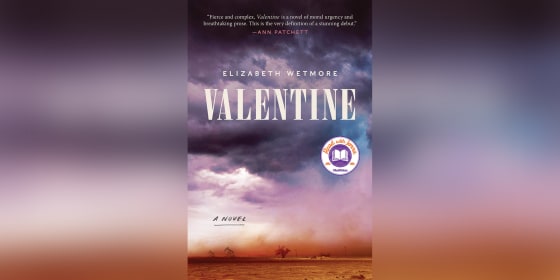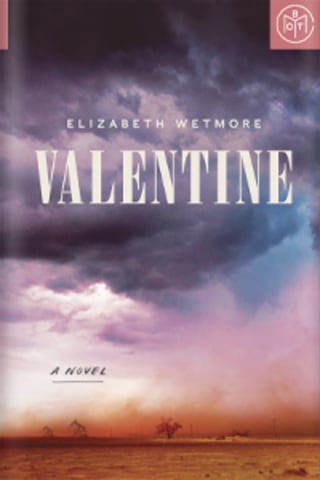There has never been a more important time to stay close to others while the country follows social distancing orders during the coronavirus pandemic. One great way to spark conversation and stay connected is by talking about a great book.
For April, Jenna Bush Hager recommended Elizabeth Wetmore's "Valentine" for her Read With Jenna book club. Wetmore's debut novel follows the aftermath of a horrific act of violence: the attack of a 14-year-old girl named Gloria Ramirez. Told through different characters' perspectives, the story explores how race and class intersect in the small, secluded town of Odessa, Texas during the cusp of an oil boom in 1976.
"Valentine" by Elizabeth Wetmore
Just so you know, TODAY has a relationship with Book of the Month Club, so we make a share of revenue from purchases on and subscriptions to Book of the Month Club.
Wetmore beautifully describes the West Texas landscape and offers a message of hope through the voices of five female narrators. There is a lot of opportunity for deep and meaningful discussion after reading this book.
The publisher of "Valentine" provided these discussion questions to consider after you've read the book. Dive into them alone or bring them to your next book club meeting.
- Consider the Texas landscape as it is richly described throughout the novel. What varying moods does it create? How does it affect the characters and their stories?
- Why does Gloria change her name to Glory? What’s powerful about the names we use?
- Gloria’s Tío Victor claims that “every story is a war story.” What might he mean?
- When does listening prove powerful and transformative throughout the novel? When does a failure to listen become harmful?
- In what ways is a violent, misogynistic man like Dale Strickland entitled and empowered by others, his town and the culture at large?
- What smaller, daily harms are done with impunity to the women in the novel? How does such behavior — often dismissed as harmless — reflect and affect larger value systems?
- Mary Rose Whitehead is criticized by her own husband for helping Glory. Why is this? How is it that her decision — to help and protect an abused girl and later testify in court — is so offensive to many in the town, even the Ladies Guild?
- How does Corrine Shepard address her grief over Potter’s death? What significance do you make of the cat that keeps “coming into (Corrine’s) backyard and killing everything”?
- Why do you think Corrine initially refuses to help Mary Rose? How and why does her attitude change?
- What is valuable for each in the secret friendship between Debra Ann and Jesse Belden? What do they understand about each other?
- In what ways is the bookmobile important, particularly to Debra Ann? What might Debra Ann mean when she tells Jesse that, “Every book has at least one good thing”?
- Ginny’s grandmother told her many stories about women who died trying to do all that was expected of them. What is the value or burden of such narratives? What story is Ginny trying to write, and is it connected to her decision to leave Odessa? Did you expect her to return?
- One lesson Suzanne Ledbetter imparts to her daughter is to “never depend on a man to take care of you ... not even one as good as your daddy.” Why is this so important? What are the obstacles to economic power for women in the novel? Which of those still exists in some form today?
- What is valuable to Corrine about the occasional “misfit or dreamer” present in her high school English class over her thirty years of teaching? What might she mean when she emphasizes to them that “stories save lives?”
- Corrine vehemently expresses to Potter how unfulfilling stay-at-home motherhood is for her. What does a fuller life look like for her and the other mothers in the novel?
- Jumping from the high dive at the YMCA pool for the first time, Aimee and Debra Ann feel like they “can do anything” and “their faith is rooted in their bodies, the muscle and sinew and bone that holds them together and says move.” How is this different from what is so often expected of the bodies of girls and women?
- What are the significant themes in the story Debra Ann tells Jesse about the old rancher’s wife and her extraordinary garden?
- What explains the profound and unjust ruling in Dale Strickland’s trial? What are the potential emotional effects of such injustice? What are the most effective ways to respond and survive?
- Karla Sibley’s experience waiting tables at the bar suggests that to speak up against the generational legacy of male entitlement, violence against women and racism “would require courage that we cannot even begin to imagine.” What then is to be done about such oppressive forces? How does Karla respond to them?
- Tío Victor eventually decides against vengeance on Dale Strickland because “nothing causes more suffering.” What might he mean? Is Dale sufficiently punished by the novel’s end, in your opinion?
- In what ways has Glory begun to heal? Though her scars “tether her to a single morning,” what is her relationship to her body as she drives toward her mother in Mexico? What will it take for her to continue to heal?
For more #ReadWithJenna selections, you can take a look back at all of Jenna's book club picks. Also, check out our Read With Jenna page.
To stay involved all month long, be sure to follow us on Instagram (don't forget to tag your photos with #ReadWithJenna), join our Read With Jenna Facebook group and follow along on Goodreads to continue the conversation about "Valentine."



